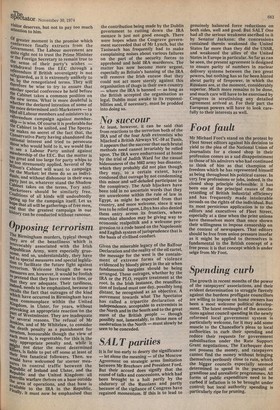No succour
At least, however, it can be said that from reactions to the terrorism both of the IRA and of the four Arab extremists who hijacked a British Airways VC-10 at Tunis, it appears that the succour that such brutal methods need cannot invariably be relied upon. The IRA were embarrassed at home by the trial of Judith Ward for the casual hideousness of the M62 army bus disaster, which they probably did not plan though they may, to a certain extent, have condoned that outrage by not condemning this minor and self-deluded participant in the conspiracy. The Arab hijackers have been told in no uncertain words that they are unwelcome within the rule of law in Egypt, as might be expected from that country, and more welcome, since it was less to be relied upon, Libya has also denied them entry across its frontiers, where anarchist abandon may be giving way to economic realpolitik and a welcome progression to a code based on the Napoleonic and English system of jurisprudence that is the basis of civilised conduct.
Given the miserable legacy of the Balfour Declaration and the reality of the oil cartel, the message for the west is the containment of extreme forms of violence evidenced by bloody piracy in the air when fundamental bargains should be being arranged. These outrages, whether by the IRA or the PLO, require treatment at the root. In the Irish instance, the reunification of Ireland must one day, possibly long distant, be recognised as an objective. A movement towards what The Spectator has called a tripartite declaration of independence, acceptable to extremists in the North and in the South and to the great mass of the British people — though possibly not, lamentably, to those men of moderation in the North — must slowly be seen to be conceded.










































 Previous page
Previous page